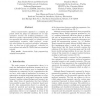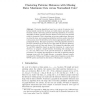76
Voted
ERSHOV
2006
Springer
15 years 5 months ago
2006
Springer
110
Voted
ENC
2006
IEEE
15 years 5 months ago
2006
IEEE
Dung's argumentation approach is a unifying approach which has played an influential role on argumentation research and Artificial Intelligence (AI). Based on a proper repres...
115
click to vote
ENC
2006
IEEE
15 years 5 months ago
2006
IEEE
In this work, by using the local node refinement technique purposed in [2, 1], and a quad-tree type algorithm [3, 13], we built a global refinement technique for Kansa's unsy...
105
click to vote
DIS
2006
Springer
15 years 5 months ago
2006
Springer
We propose a novel method, called heterogeneous clustering ensemble (HCE), to generate robust clustering results that combine multiple partitions (clusters) derived from various cl...
111
click to vote
DIS
2006
Springer
15 years 5 months ago
2006
Springer
Mars probes send back to Earth enormous amount of data. Automating the analysis of this data and its interpretation represents a challenging test of significant benefit to the doma...
133
click to vote
DIS
2006
Springer
15 years 5 months ago
2006
Springer
Abstract. We investigate a generative latent variable model for modelbased word saliency estimation for text modelling and classification. The estimation algorithm derived is able ...
DIS
2006
Springer
15 years 5 months ago
2006
Springer
Abstract. To the best of our knowledge, this paper is the first attempt to formalise a pragmatic logic of scientific discovery in a manner such that it can be realised by scientist...
107
click to vote
DIS
2006
Springer
15 years 5 months ago
2006
Springer
Paleoclimatology requires the analysis of paleo time-series, obtained from a number of independent techniques and instruments, produced by several researchers and/or laboratories. ...
117
click to vote
DIS
2006
Springer
15 years 5 months ago
2006
Springer
Incremental learning is an approach to deal with the classification task when datasets are too large or when new examples can arrive at any time. One possible approach uses concent...
110
click to vote
DIS
2006
Springer
15 years 5 months ago
2006
Springer
Abstract. Clustering algorithms based on a matrix of pairwise similarities (kernel matrix) for the data are widely known and used, a particularly popular class being spectral clust...


